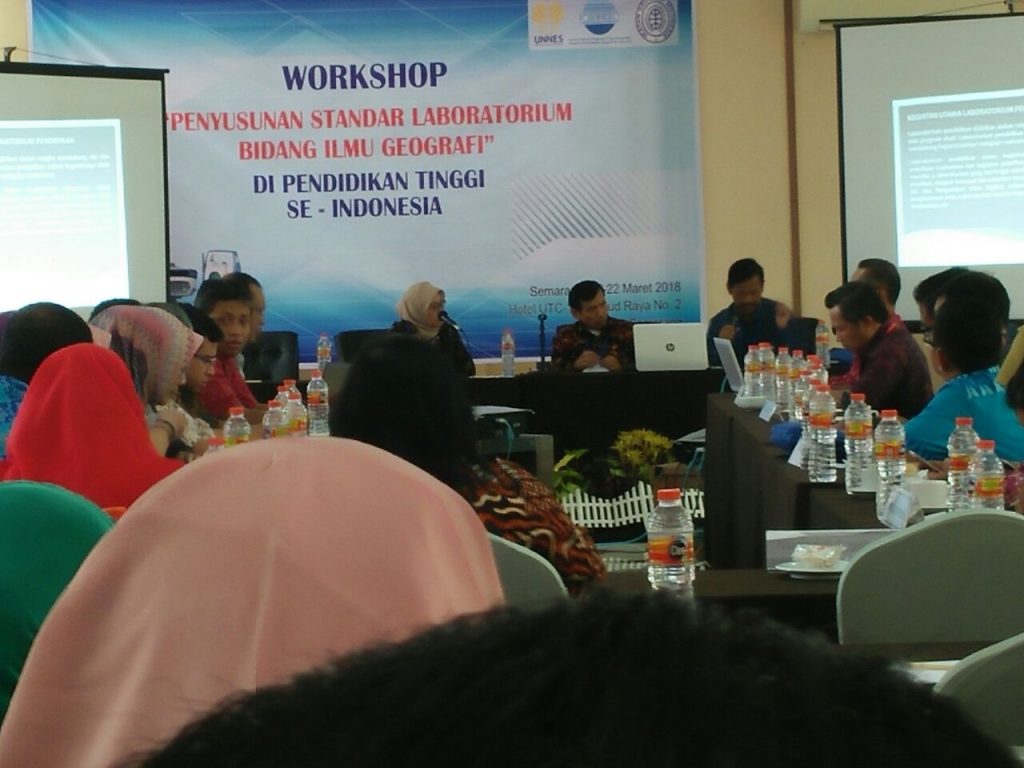This workshop is an agenda program designed in collaboration with the Indonesian Geographical Association (IGI) with the Leaders Forum of Higher Education in Geography and Geography Education in Indonesia (FORPIMGEO). Some of the main backgrounds for the implementation of this agenda are as follows: (1) The need for research on the development of geography that leads to a site scale for each human activity requires a detailed and in-depth analysis of geographical phenomena, so that the need for a minimum standard of geography laboratory is required in in order to support research that is able to solve geographical problems in an increasingly complex society, (2) The need for applied research in geographic science that must be able to provide solutions to all questions related to location suitability requires measurements of environmental parameters that have high precision and accuracy, by Therefore, the need for laboratories with high technology and always up-to-date is a must in the development of geographic science, (3) The need for a location that can be used as a comprehensive study model so that it can show the public as a geographical solution to a particular environmental problem. This can be manifested in the need for field laboratories or natural laboratories that can be owned by every university in the field of geography, (4) The need for scientific existence can be assessed from the existence of high and reputable publications, therefore, the need for laboratories with adequate facilities is expected to be in harmony to encourage increased publications in the field of geography, (5) Laboratory development in higher education has a function in optimizing learning and teaching activities, therefore, the need for a minimum standard size laboratory along with its functions and ratio of tool use to student users needs to be attention, (6) Each university needs to develop uniquely / distinctively according to regional needs and the strength of its human resources – SARPRAS so as to create collaborative relationships between fellow geographical institutions, and (7) Laboratory development at this time also needs to consider Figure out the existence of the Indonesian National Work Qualification Standard (SKKNI), because every human resource from higher education in the future will be encouraged to be qualified in terms of geographical competence. In addition, the need for Competency Test Places (TUK) in each region is very high, making it easier for graduates to take competency certification in that area.
Based on the background of the problems above, the scope of the discussion in this workshop can be determined, namely: (1) Learning achievement in each university, will later affect the position of the laboratory, (2) Categorization of Laboratory Types (Educational or Testing Lab, Integrated Lab). , Lab. Nature, etc.), (3) Field of Laboratory (Geophysical, Geohuman, Geotechnical, Georegional, Geospatial Information Technology, etc.), (4) Laboratory Activities by Type and Field (for education, research, service, and support according to SKKNI standards), (5) Minimum Standards for Tools and Modules, (6) Laboratory Personnel (training laboratory personnel: managers, researchers, and operators), (7) Management Requirements (Document Design, Organization, Management System, Services, Complaints, etc.) ), (8) Quality Assurance System (assurance by internal and external accreditation agencies), and (9) Cooperation and Collaboration Scheme for Utilization of IGI Member Laboratories (eg apprenticeship scheme and lecturers, laboratory assistants, and students)

